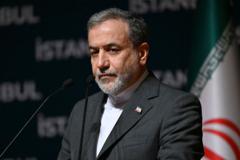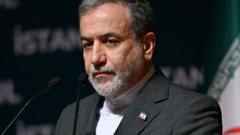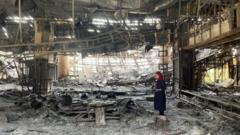Following recent bombings by the US and Israel, Iranian Foreign Minister Abbas Araghchi admitted to "excessive and serious" damage at the nation's nuclear sites, differing from Supreme Leader Ayatollah Ali Khamenei's assertions of minimal disruption. Araghchi also announced the suspension of nuclear talks with the US and indicated legislative action to diminish cooperation with global nuclear watchdogs.
Iran's Foreign Minister Acknowledges Heavy Damage to Nuclear Sites Amid Conflicting Statements

Iran's Foreign Minister Acknowledges Heavy Damage to Nuclear Sites Amid Conflicting Statements
Abbas Araghchi reveals excessive damage from US and Israeli bombings, contradicting the Supreme Leader's claims of no significant impact.
Iran's Foreign Minister Abbas Araghchi acknowledged that significant and "excessive" damage has been inflicted on the country’s nuclear facilities following bombings orchestrated by the US and Israel. In a statement aired on state television, Araghchi confirmed that an evaluation of the damage was underway, which is being conducted by the Atomic Energy Organisation of Iran. This admission comes shortly after Iran's Supreme Leader, Ayatollah Ali Khamenei, claimed that the attacks had not meaningfully interrupted the Iranian nuclear program. Khamenei, in his remarks, dismissed U.S. President Donald Trump’s comments about the bombings obliterating three nuclear sites as an exaggeration, proclaiming a kind of victory over both the U.S. and Israel.
Contrasting Khamenei’s assurances, Araghchi’s comments reflect a more concerning reality regarding the extent of the impacts on Iran's nuclear initiatives. The foreign minister declared that there would be no immediate plans to resume negotiations concerning nuclear agreements with the US, having canceled a scheduled round of discussions in protest against Israeli strikes. “No agreement or conversation regarding new negotiations has been established,” he stated, indicating that Iran’s diplomatic direction might evolve but offering no specific details on what that might entail.
In a bid to return Iran to negotiations, the Trump administration has floated the idea of financial assistance for a civil nuclear energy program, alongside easing sanctions. However, recent developments in Iran, compounded by Parliament's approval to halt cooperation with the International Atomic Energy Agency (IAEA), pose challenges to such negotiations. The proposed bill, if enacted, would legally permit Iran to deny access to nuclear inspectors.
Israel maintains that its military actions were necessary to disrupt Iran's ambitions toward developing nuclear weapons, whilst Iran has consistently insisted that its nuclear aims are solely for peaceful energy production. The US became directly involved in the conflict with air strikes targeting facilities in Fordo, Natanz, and Isfahan. According to US Defence Secretary Pete Hegseth, the attacks have significantly hindered Iran's nuclear progress, possibly setting it back for years. Contradicting these assertions, a leaked preliminary Pentagon assessment suggested that the damage was rather limited, estimating delays of only a few months. The U.S. administration has dismissed these evaluations as inaccurate. Amidst the turmoil, Iran's health ministry reported over 600 fatalities attributed to the recent aerial assaults, while Israeli sources confirmed 28 casualties from within their borders.





















